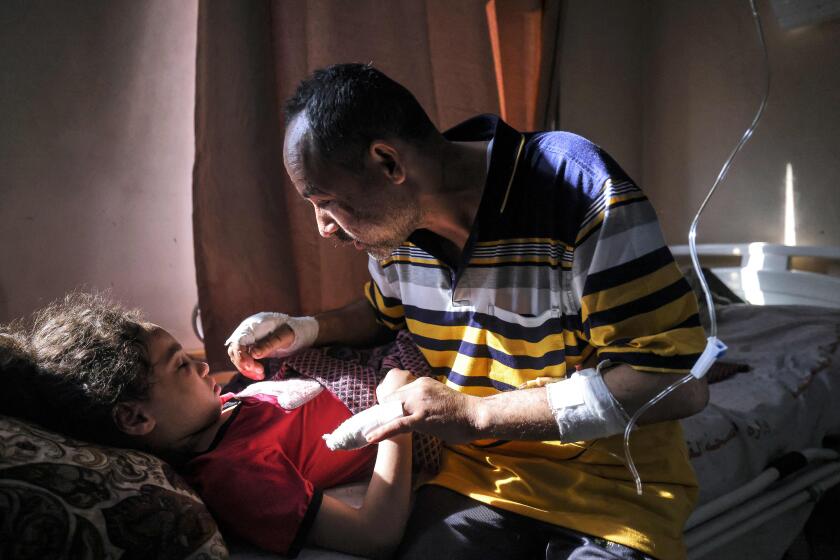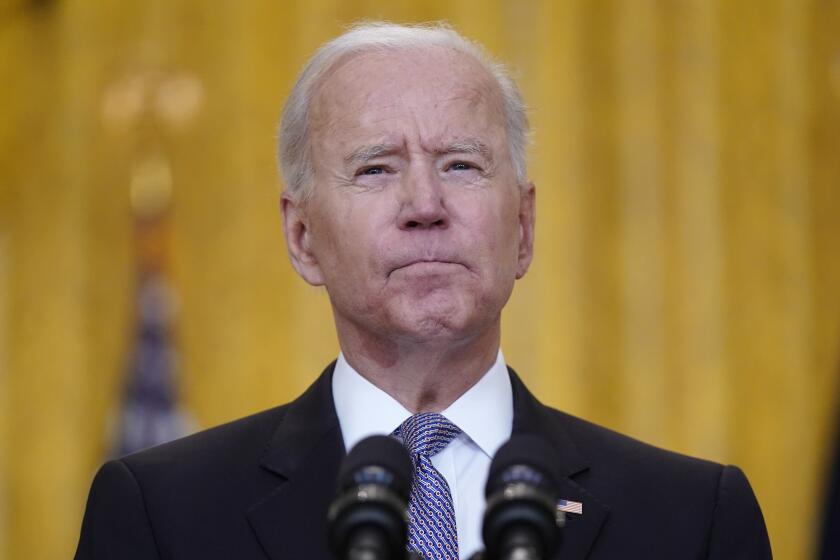In Gaza, children hide and buildings fall from Israeli airstrikes
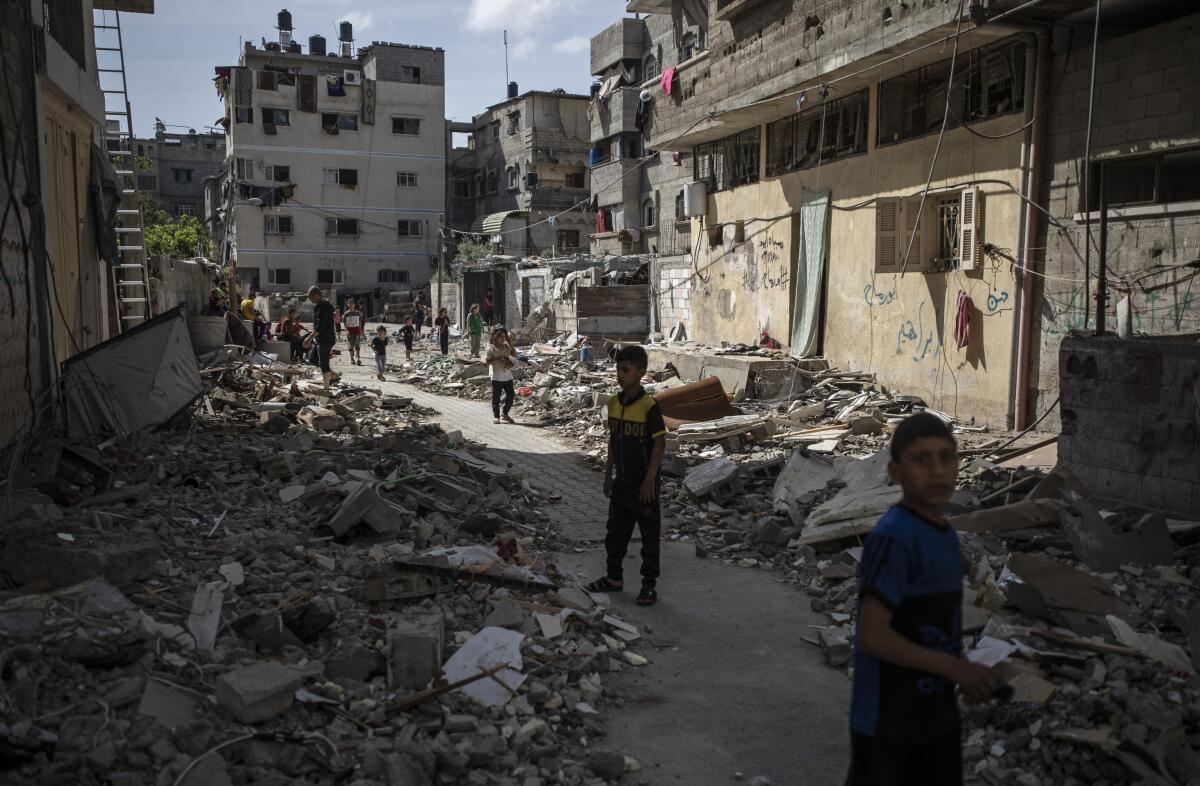
GAZA CITY — Every night brings the war ritual for Randa Suleiman: She gathers her children, collects their favorite toys and looks for a hiding place in their home, listening for Israeli warplanes and bombs that will streak and fall through the Gaza darkness.
“From 11 p.m., we prepare ourselves,” she said. “You hear [the children] talk about if they’re going to have to escape from the house or if they’re going to die.”
It has been like this for days, the sky alight with rage. Suleiman, 40, is a guidance counselor, but she said she has no idea how to comfort her 15-year-old and 8-year-old boys. “As a mother, I can’t even help myself, let alone help them. Every moment I imagine I’m going to lose them.”
In the week since the Israeli-Palestinian conflict flared anew, Israeli warplanes have crisscrossed with thousands of rockets fired by Hamas that have chased Israelis into bomb shelters in Tel Aviv and other cities. The onslaught, the worst in seven years, has left hundreds dead — the vast majority of them Palestinians — along with more than a thousand wounded, authorities say.
Israel continues its assault on the Gaza Strip as the U.S. and others call for a cease-fire.
The war and Israel’s overwhelmingly superior firepower has upended life for the 2 million Palestinians of this heavily populated, impoverished strip of land along the Mediterranean Sea. Days and nights here are filled with tracer fire, white plumes, falling buildings, burials and fears of worsening coronavirus infections.
The Israeli military unleashed a barrage on Monday that many Palestinians said was the most intense they had experienced since the start of the fighting, which began when Israeli police raided the Al-Aqsa Mosque following unrest over threatened expulsions of Palestinian families in East Jerusalem by Jewish settlers.
“It was like nothing we’ve seen,” said Raja Ahmad, 45, who lives in the Tal Al-Hawa neighborhood of Gaza City. “I was sure every building in our neighborhood was going to get hit. My kids were clinging to me. They were just terrified.”
The bombardment, said Mohammad Jamil, a 38-year-old university student who had come to Gaza a few months ago for a family visit from Berlin, is “just crazy. We didn’t even put on clothes before we ran down to the basement and took shelter. I was telling my children they shouldn’t worry, that it was just god and his wife having a fight.”
“I woke up in the morning and just saw houses gone — nothing but dust.”
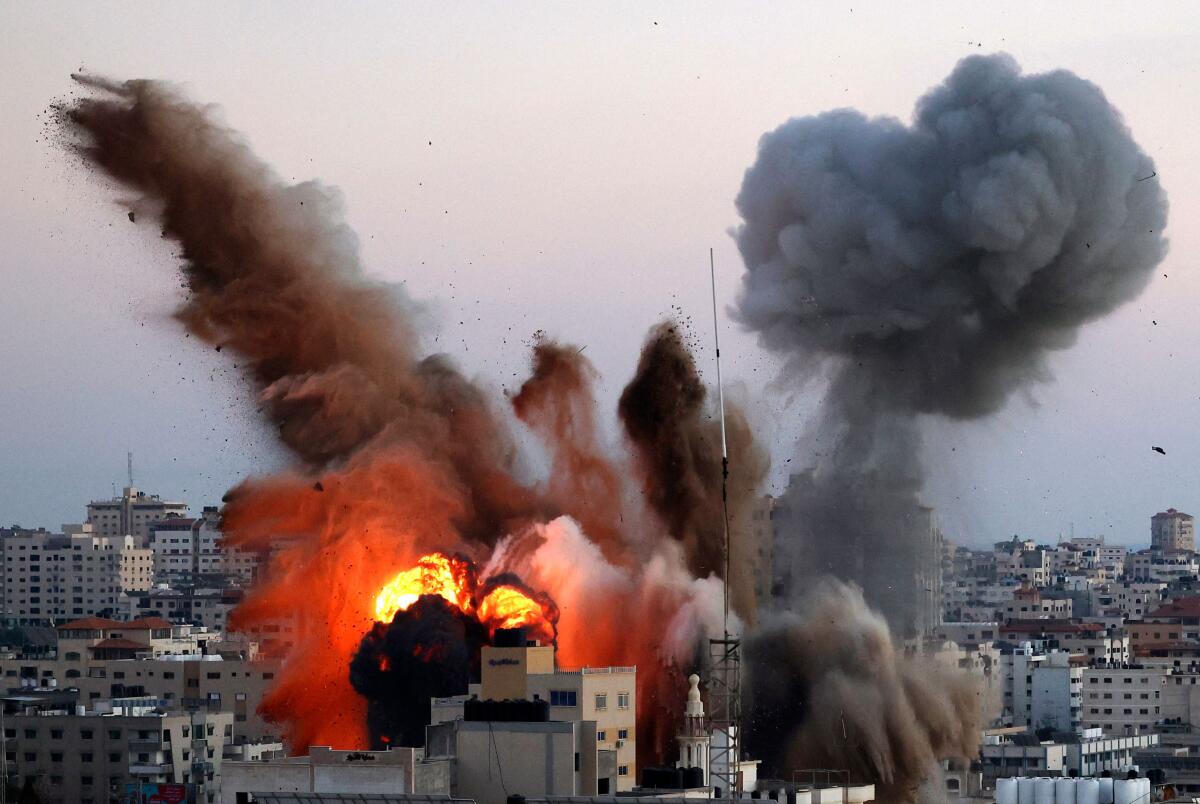
The number of casualties from Monday’s strikes remained unclear. But the Gaza Health Ministry said at least 200 Palestinians have been killed, including 59 children, along with 1,300 wounded. The United Nations says at least 35,000 so far have fled their homes. Ten people have been killed in Israel, authorities there said, including a soldier as well as a 5-year-old boy, as a result of the more than 3,150 rockets launched at Israeli territory from Gaza. The military added that 460 rockets had misfired, while Israel’s Iron Dome defense system had intercepted 90% of firings.
The White House says President Biden expressed “support” for a cease-fire in a call to Israeli Prime Minister Benjamin Netanyahu Monday, the eighth day of Israeli-Palestinian fighting.
Calls for a truce have been unsuccessful despite intensifying diplomatic maneuvering. With the conflict careening into its second week, Israeli Prime Minister Benjamin Netanyahu said the military campaign would go on even as international pressure on Israel grows over the destruction and rising civilian deaths in Gaza. Hamas has been just as defiant in carrying out attacks on Israeli territory.
Residents in the Palestinian coastal strip, which is blockaded by Israel and Egypt, have long endured eight-hour power cuts. But these days electricity comes in four-hour bursts — if that — and there isn’t enough fuel to run diesel generators.
Water and internet, both governed by the power supply, have been affected, triggering water shortages. Streets are ghost-like, with no one daring to drive their car for fear that a grocery run could attract an air strike. No electricity means nights are reduced to a waiting game in the dark for when the next strike will come.
Mornings bring an accounting of what buildings are still standing and the guilty relief of having lived another day. Otherwise, there is no respite from the war, Suleiman said. Seven years ago, in one of the previous bouts of the conflict between Israel and Hamas, Suleiman had been able to report to her work. Not this time.
“Today we don’t trust to even go out of the house. All the time we hear of a bomb here, a bomb hitting there, that a house is going to get bombed,” she said. “We’re all living around each other. Where do we go? We’re just hoping for a truce. We can’t take another day of this.”
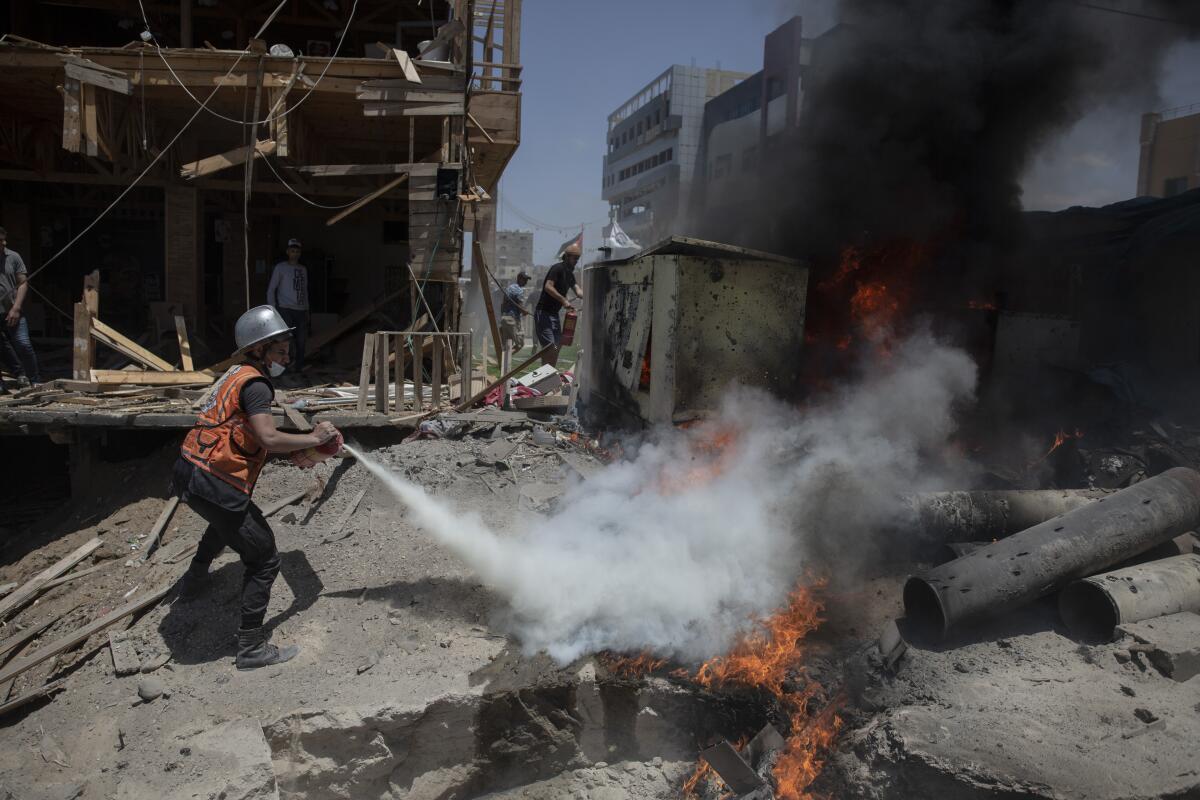
The coronavirus, meanwhile, remains a threat in an area where the government’s response has all but collapsed. “When you launch a war on 2 million people with no health infrastructure, where even without war you can barely treat people, then COVID is almost a biological weapon,” Jamil said.
His house was one of the few in his northern Gazan neighborhood to have a basement. He and his family shelter there. But he feared he would get an infection from his brother, who had fallen ill with the virus a few days ago.
“There’s nothing I can do. Because of this situation, I can’t have other people come here or go elsewhere myself,” he said. A roar of jets interrupted him. A few beats later, he said the strike must have targeted another neighborhood.
On Sunday, the deadliest day of battle, one of the early morning strikes hit the house of Ayman Abu Ouf, head of internal medicine and director of the COVID-19 unit at Al-Shifa hospital, the strip’s biggest medical establishment and the training ground for thousands of doctors.
Thirty minutes before the attack, Ouf had finished his shift at Al-Shifa and headed home. Rescue workers, digging for hours through mangled apartment buildings, recovered his body. He was one of 33 killed in that bombing.
“We waited for four hours to get word. I slept for two hours and then I saw the news,” said Osaid Ser, a doctor who had studied with Ouf in Gaza now finishing his post-doctoral research at Massachusetts General in Boston. “It’s a huge loss. He was a mentor to thousands of us.”
Israel’s military said on Monday that its warplanes had conducted more than 830 strikes on the strip, turning residential towers, major thoroughfares and other infrastructure into rubble. Gaza’s municipality accused Israel of exacting collective punishment by hindering access to hospitals and ravaging the strip’s already overburdened networks.
Netanyahu has insisted that the attacks were an effort to “degrade Hamas’ terrorist abilities.” He added: “We are targeting a terrorist organization that is targeting our civilians and hiding behind their civilians, using them as human shields. We’re doing everything we can to hit the terrorists themselves, their rockets, their rocket caches and their arms.”
But whatever fears people here have for the coastal strip’s immediate future have been compounded by the unprecedented scale of the campaign, not to mention its long-term impact on Gaza’s dire economy. A past confrontation had left 46-year-old Alia Zimmo without a job. That spurred her family to open a clothing store on Al-Rimal street, a major commercial artery in Gaza City.
“We thought our store could give us a source of income,” she said.
She had been looking forward to Eid al-Fitr, a time when families would come to Al-Rimal for shopping in celebration of the end of Ramadan. But when air raids obliterated two nearby buildings, the fallout destroyed $50,000 worth of merchandise and left her store — it was called “She Fashion” — in ruins.
She doesn’t think she can afford to rebuild.
“The street? I don’t think it will go back to what it was. All commercial areas are destroyed, so are the roads, so people can’t even get to you,” she said. “And it’s difficult for us to go somewhere else. Where would I go? The whole city is ruined. There’s no place in Gaza that’s good for life. You can only think of leaving.”
North of Gaza City, 43-year-old Atef Subuh had struck a deal before the end of Ramadan to sell his crop of watermelons. Instead, his farm burned overnight when Israeli munitions hit a target near him, destroying much of his farm equipment along with irrigation wells.
“If you go, you wouldn’t even know there was anything planted here,” he said. “I’m in debt, and I have to take care of nine people. Everything I bought on credit because I was relying on this crop to do it.”
Israel says it has taken steps to minimize civilian casualties, including giving warning calls and firing missiles to “knock” on roofs before the attack. But many here believe that the country’s actions amount to a virtual erasure of the city — and the life — they had known up until last week.
“The aim,” said Jamil, “is to make people not recognize Gaza when this is finished.”
Over the last two years, Suleiman said, there had been an uptick of investments in residential towers, and refurbishment of parks as well as the coastal thoroughfare running along Gaza’s Mediterranean coast. These were the places where Suleiman would go with her family.
“All that’s gone. When they ever let us go out again, we won’t know where to go,” she said. “Even when this ends, are we going to be happy again?”
Special correspondent Salah reported from Gaza City and staff writer Bulos from Beirut.
More to Read
Sign up for Essential California
The most important California stories and recommendations in your inbox every morning.
You may occasionally receive promotional content from the Los Angeles Times.
